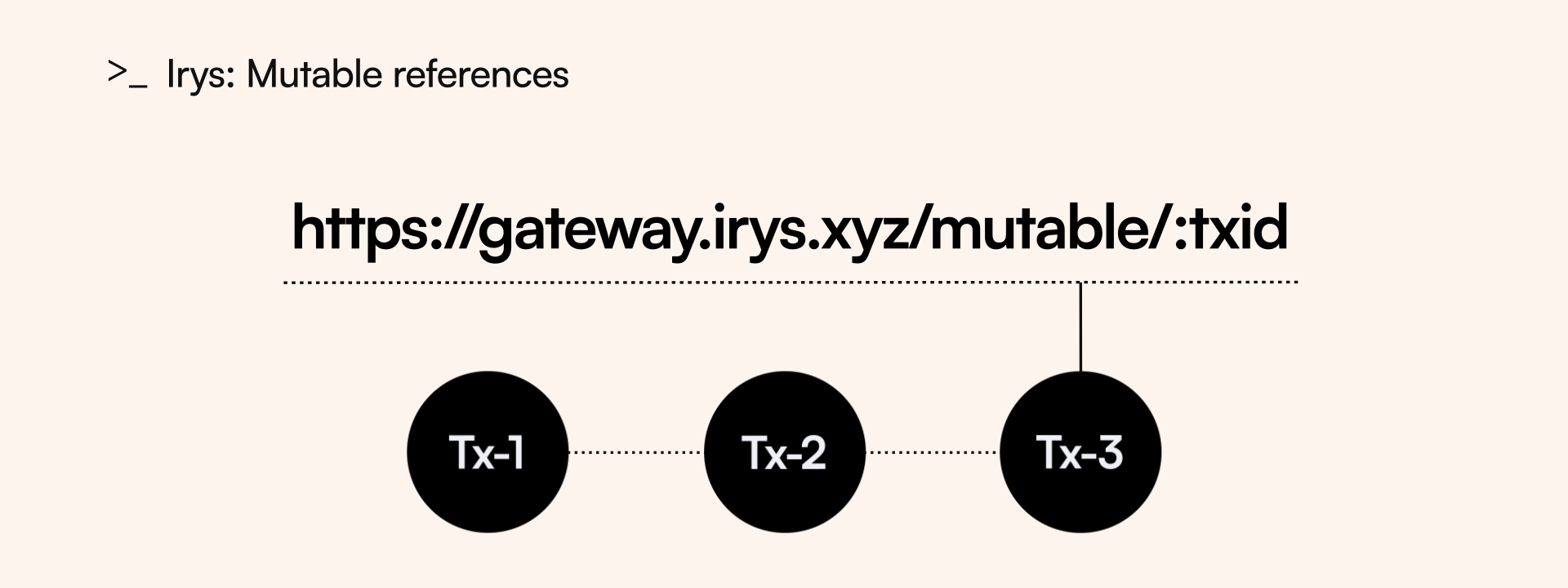Mutable references
Mutable references enable the creation of a single, static URL that is linked to a sequential series of transactions. You can add a new transaction to the series at any time, and the URL will always resolve to the most recent transaction.

To create a mutable reference:
- Upload a base transaction to Irys and reference it using a URL in the following format
https://gateway.irys.xyz/mutable/:id
const irys = await getIrys();
const receiptOne = await irys.upload("First TX");
console.log(`TX 1 uploaded https://gateway.irys.xyz/mutable/${receiptOne.id}`);- Upload an addition to the series as a new transaction, and add a tag named
Root-TXwith the value of the original transaction ID.
const tags = [{ name: "Root-TX", value: receiptOne.id }];
const receiptTwo = await irys.upload("Second TX", { tags: tags });
console.log(`TX 2 uploaded https://gateway.irys.xyz/mutable/${receiptOne.id}`);The original URL (https://gateway.irys.xyz/mutable/:id) now resolves to the second transaction in the chain.
When building a transaction chain, additions must be made using the same wallet that created the original transaction. This prevents unauthorized actors from maliciously modifying someone else’s transaction chain.
Granularity
Mutable references are based on Irys’ millisecond-accurate timestamps. You can publish multiple sequential updates to a given transaction and be confident the transaction served by the /mutable/ endpoint will always be the most recent chronological one.
Versions
While the https://gateway.irys.xyz/mutable/:id endpoint will always resolve to the most recent transaction in a chain, it is possible to directly access any transaction in a chain using the transaction’s ID and a URL in the format https://gateway.irys.xyz/:id
You can query a version chain using the Irys query package:
import Query from "@irys/query";
const txID = "WF--VR1ZERvABYy1aNYD3QJ0OAVDSUF8dTlg6zFKveQ";
const fromAddress = "0x591b5ce7ca10a55a9b5d1516ef89693d5b3586b8";
const myQuery = new Query({ network: "mainnet" });
const results = await myQuery
.search("irys:transactions")
.tags([{ name: "Root-TX", values: [txID] }])
.from([fromAddress])
.sort("ASC");
results.forEach((result, i) => {
const formattedTimestamp = new Date(result.timestamp).toLocaleString();
console.log(`Update ${i + 1}: ID: ${result.id}, Timestamp: ${formattedTimestamp}`);
});Or GraphQL:
query getChain {
transactions(
tags: [
{
name: "Root-TX"
values: ["WF--VR1ZERvABYy1aNYD3QJ0OAVDSUF8dTlg6zFKveQ"]
}
]
owners: ["0x591b5ce7ca10a55a9b5d1516ef89693d5b3586b8"]
order: ASC
) {
edges {
node {
id
timestamp
}
}
}
}Use-cases
Irys’ mutable references open up new opportunities for builders, including:
- Gaming NFTs: Metadata changes based on in-game actions
- Dynamic NFTs: Images change based on onchain activity
- Software distribution: The latest version is always available via the same link
- Content publishing / social media: Content can be updated at any time and users will always have the most recent version
- Website hosting / dApp front-ends: Websites can be updated at any time without changing the main URL